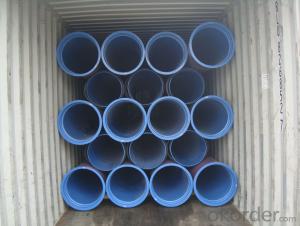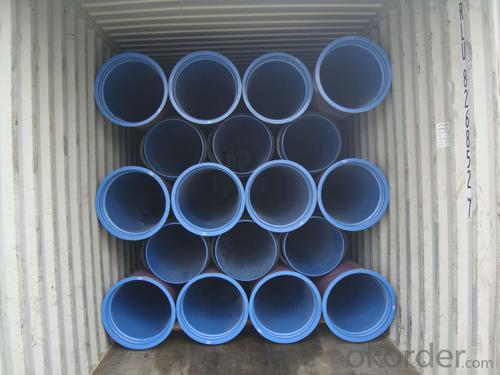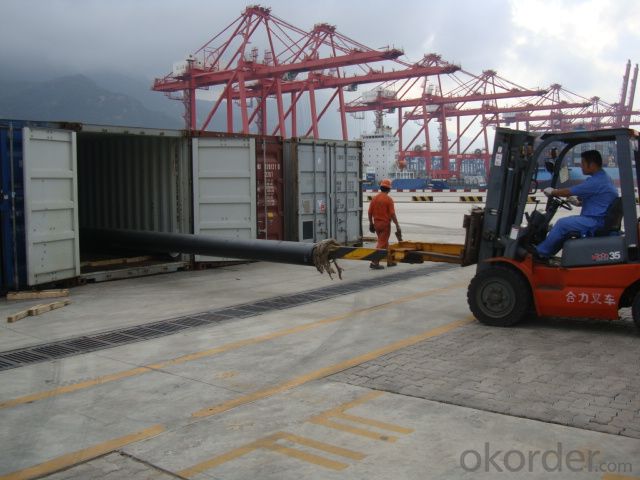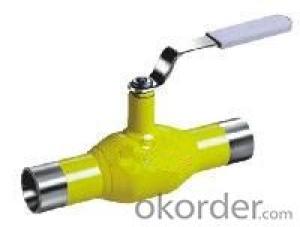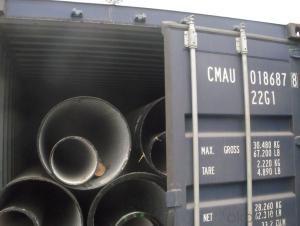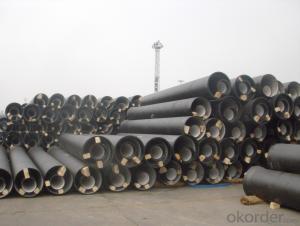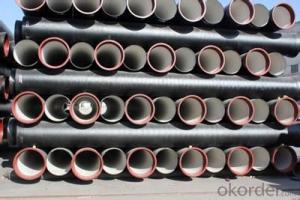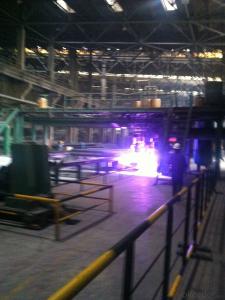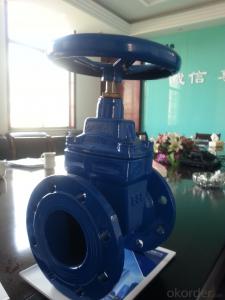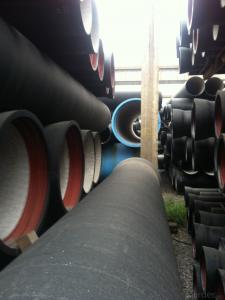DUCTILE IRON PIPES AND PIPE FITTINGS K8 CLASS DN1700
- Loading Port:
- Tianjin
- Payment Terms:
- TT OR LC
- Min Order Qty:
- 22 pc
- Supply Capability:
- 3000 pc/month
OKorder Service Pledge
OKorder Financial Service
You Might Also Like
Material : Ductile Cast Iron
Size Range : DN 80mm to DN 2000mm
Unit Effective Length : 6m or 5.7m
Manufacture Standard: ISO 2531:1998/ EN 545:2006/EN 598:2007
Annual capacity : 200,000 tons
Coating Exterior: Zinc 130g/m2 according to ISO 8179-1 and bitumen coating 70 microns.
Cement Interior: Portland Cement/ High Alumina Cement/ Sulphate Resisting Cement Lining according to ISO 4179
Special requirements on external coating and internal lining can be applied
We also provide accessories such as SBR/EPDM rubber gaskets, lubricant paste, pipe caps, PE sleeves, etc.
Additional Parts:
Each pipe is strictly inspected according to related standard to ensure permanently high performance.
Easy Installation at site and service free for life
Long Service Lifespan
Quotation will arrive you within 24hours once we get your inquiry.
We guarantee offering you a competitive price.
A copy of original inspection reports of pipes will be offered after shipment.
Photos of loading process will be sent to the customer after shipment effect.
We will follow-up the delivery progress after shipment effect and update to the customer on weekly basis.
- Q: How is ductile iron pipe different from cast iron pipe?
- Ductile iron pipe and cast iron pipe are commonly used in plumbing and drainage applications, but they have differences in composition, strength, and flexibility. To begin with, ductile iron pipe is made from a different iron alloy than cast iron pipe. Ductile iron contains more carbon and silicon, which gives it increased strength and durability. On the other hand, cast iron pipe is made from gray iron, which has higher carbon content but lacks the flexibility of ductile iron. Moreover, ductile iron pipe is renowned for its superior strength and resistance to impact. It can withstand higher pressures and is less likely to crack or break under heavy loads or external forces. Cast iron pipe, although strong, is more brittle and prone to fractures and failures. Another significant distinction is the flexibility of ductile iron pipe. It possesses greater flexibility and can endure bending and deformation without fracturing. This flexibility facilitates easier installation, particularly in areas with uneven terrain or where ground movement may occur. In contrast, cast iron pipe is less flexible and more rigid, making it unsuitable for applications that require flexibility. Additionally, ductile iron pipe has a smoother interior surface compared to cast iron pipe. This smoothness reduces friction, enhances flow efficiency, and minimizes the accumulation of sediment and deposits within the pipe, resulting in improved water flow and reduced maintenance needs. In conclusion, ductile iron pipe sets itself apart from cast iron pipe due to its composition, strength, flexibility, and smooth interior surface. Ductile iron offers superior strength, impact resistance, and flexibility, making it the preferred choice in various plumbing and drainage applications.
- Q: Are ductile iron pipes suitable for installation in areas with high groundwater table?
- Indeed, areas with a high groundwater table are suitable for the installation of ductile iron pipes. These pipes are renowned for their exceptional strength and durability, rendering them perfect for underground installations. They possess the ability to endure the external pressure exerted by groundwater without any deformation or collapse. In addition, their outstanding resistance to corrosion shields them from the potentially harmful impact of groundwater. Consequently, ductile iron pipes can be confidently utilized in areas with a high groundwater table, ensuring the establishment of dependable and enduring water supply infrastructure.
- Q: How do ductile iron pipes handle thermal cycling in industrial applications?
- Ductile iron pipes are well-suited for handling thermal cycling in industrial applications. Due to their high thermal conductivity and low thermal expansion coefficient, they can effectively and safely withstand the stresses caused by repeated heating and cooling cycles. This makes them highly resistant to cracking, distortion, or other forms of thermal damage, ensuring their durability and reliability in industrial environments.
- Q: What is the expected buoyancy of ductile iron pipes?
- The expected buoyancy of ductile iron pipes is minimal due to their high density and weight.
- Q: What is the expected roughness coefficient of ductile iron pipes?
- The expected roughness coefficient of ductile iron pipes is typically between 0.01 to 0.015.
- Q: Can ductile iron pipe be used for road and highway crossings?
- Yes, ductile iron pipe can be used for road and highway crossings. Ductile iron is a strong and durable material that is well-suited for underground infrastructure projects, including road and highway crossings. It provides excellent resistance to heavy loads, corrosion, and external forces, making it suitable for withstanding the traffic and environmental conditions associated with road and highway crossings. Additionally, ductile iron pipe is available in various sizes and strengths, allowing for customization based on the specific requirements of the crossing. Proper installation techniques and adherence to relevant industry standards are essential to ensure the longevity and performance of ductile iron pipes in road and highway crossings.
- Q: How do ductile iron pipes perform in high-velocity water flow conditions?
- High-velocity water flow conditions are easily handled by ductile iron pipes. Their composition and manufacturing process give them remarkable strength and durability, making them highly resistant to the forces generated by fast-flowing water. These pipes are specifically designed to endure significant hydraulic pressure and turbulent conditions. Their inherent ductility allows them to absorb the energy of the flowing water and effectively dissipate any potential stress or impact that may arise. Furthermore, the smooth internal surface of ductile iron pipes reduces frictional losses, ensuring efficient water flow even at high speeds. This characteristic is vital in maintaining the necessary water pressure and flow rates in various applications, including water distribution systems, sewage networks, and industrial processes. Additionally, the corrosion resistance of ductile iron pipes enhances their performance in high-velocity water flow conditions. Typically, these pipes are lined with cement mortar or polyethylene, providing extra protection against the corrosive effects of fast-flowing water. In summary, ductile iron pipes are perfectly suited for high-velocity water flow conditions, offering exceptional strength, durability, and hydraulic efficiency. Their ability to withstand the challenges posed by fast-flowing water makes them a reliable choice for a wide range of applications where high water velocity is a concern.
- Q: Can ductile iron pipes be used for stormwater management?
- Certainly, stormwater management can make use of ductile iron pipes. Ductile iron, being a robust and enduring material, possesses resistance against corrosion and can endure the high rates of flow and pressure typically linked with stormwater management systems. These pipes have found extensive application across various fields, including stormwater drainage and sewage systems. Their capacity to handle substantial loads and endure environmental factors renders them an appropriate option for stormwater management, guaranteeing the smooth flow of water and averting flooding in urban regions. In addition, ductile iron pipes boast a lengthy lifespan, minimizing the necessity for frequent maintenance and replacement, thus proving to be a cost-effective selection for stormwater management infrastructure.
- Q: What are the advantages of using ductile iron pipes over other materials?
- There are several advantages of using ductile iron pipes over other materials. Firstly, ductile iron pipes have a high tensile strength, which makes them more resistant to pressure and external forces, reducing the risk of cracks or leaks. Secondly, ductile iron pipes have a longer lifespan compared to other materials, as they are highly durable and resistant to corrosion. Additionally, ductile iron pipes have a smooth internal surface, promoting efficient water flow and minimizing the risk of blockages. Lastly, ductile iron pipes are relatively cost-effective and easy to install, making them a preferred choice for various applications in water distribution, sewer systems, and industrial settings.
- Q: Are ductile iron pipes resistant to environmental stress cracking?
- Indeed, environmental stress cracking is not a concern for ductile iron pipes. Ductile iron, a form of cast iron that has been infused with small amounts of magnesium for enhanced strength and ductility, possesses this advantageous quality. Consequently, these pipes exhibit exceptional resistance to cracking and harm caused by environmental stress factors like temperature fluctuations, soil shifting, and corrosive elements present in the surrounding environment. Moreover, the inherent robustness and adaptability of ductile iron enable it to endure substantial external pressure and stress without succumbing to cracking or failure. Ultimately, ductile iron pipes are a dependable and long-lasting option for various purposes, such as the transportation of water and wastewater, thanks to their ability to withstand environmental stress cracking.
Send your message to us
DUCTILE IRON PIPES AND PIPE FITTINGS K8 CLASS DN1700
- Loading Port:
- Tianjin
- Payment Terms:
- TT OR LC
- Min Order Qty:
- 22 pc
- Supply Capability:
- 3000 pc/month
OKorder Service Pledge
OKorder Financial Service
Similar products
Hot products
Hot Searches
Related keywords
